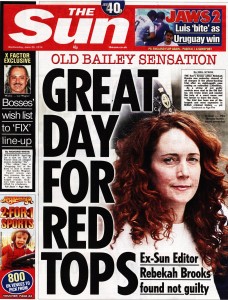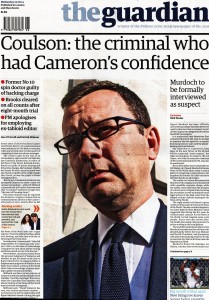“Keep Out” of press regulation
Posted by: Nicholas Jones

Rebekah Brooks’ acquittal on the charge of phone hacking will be interpreted by much of the newspaper industry as a vote of confidence in its decision to defy Parliament and to press ahead with the launch in the autumn of a new, independent press regulator.
“Keep Out” could almost be the caption below the Sun’s front page welcoming what is said were “a string of not guilty verdicts” after a trial that had been “one of the longest and most expensive in British criminal history”.
Brooks’ not guilty verdict was greeted with great relief by those newspaper proprietors and editors who have turned their back on the Royal Charter on press regulation that gained cross-party support in the wake of the Leveson Inquiry.
Andy Coulson’s conviction for conspiracy to hack phones had been widely expected among fellow journalists. But his finding of guilt – and guilty pleas from five others who were involved – has largely contained fallout from the case within the confines of journalists employed on the now defunct News of the World.
David Cameron’s swift apology for his “bad decision” in 2007 for having given Coulson a second chance by appointing him the Conservative Party’s pre-election publicity chief, and later taking him into Downing Street as the government’s director of communications, was aimed a drawing a line under the affair.

The Prime Minister’s political opponents are hardly like to let up in criticising his judgement but with only ten months to go to the general election both the Labour Party and the Liberal Democrats know that while Cameron himself remains the target they will have to beware of collateral damage to their wider relationship to the news media.
However, by reaching not guilty verdicts in the cases of both Rebekah and Charlie Brooks (24.6.2014), an Old Bailey jury avoided, what for the Prime Minister, would have been an even worse scenario of continued focus on the extent of his socialising with Rupert Murdoch’s executives and especially with what had become known (after his constituency home) as the Chipping Norton set.
Many of Brooks’ former colleagues at News International – and editorial executives on rival newspapers – believed that unlawful phone hacking on the “industrial scale” that was revealed during the trial, was very much the preserve of the News of the World’s newsroom.
They knew that she was seen as the trophy target of Labour and groups like Hacked Off and that her conviction might well have made it harder for the industry to demonstrate that its new regulator, the Independent Press Standards Organisation, will have far greater clout than the previous Press Complaints Commission.
Trials involving other News International journalists have yet to take place but the campaigners for statutory press regulator have been denied Brooks’ scalp and that takes some of the heat out of their demand that the government should press ahead with a state-backed regulator.
Sajid Javid, the new Secretary of State for Culture, signalled in April that he was ready to draw a line under the controversy about what should replace the Press Complaints Commission. He said the government had “no further role” and it was up to the press to decide whether the industry should be subjected to the terms of the royal charter.
Re-opening that issue was clearly not the priority of Ed Miliband, the Labour leader, when he challenged the Prime Minister at question time (25.6.2014) over his failure to heed warnings about Coulson’s suitability or to have asked for the highest level of security vetting.
Cameron insisted his own role in Coulson’s appointment had been considered by the Leveson Inquiry. He denied he had been negligent at the time: “Leveson made no criticism of my conduct in this respect whatsoever. He looked into all of the issues about the warnings I was given and the response I gave and he made no criticism of my conduct.”
Of all the lessons that have learned from the News of the World scandal perhaps the most significant for the three main parties in the run up to the general election is that they would be best advised to keep their relations with press proprietors and editors at arm’s length.
The three main parties have all brought in outsiders from abroad to give advice on their pre-election media strategies. Instead of following the example of Cameron or Tony Blair in appointing another Andy Coulson (ex-News of the World) or an Alastair Campbell (ex-Daily Mirror), the Conservatives have brought in the Australian media strategist Lynton Crosby, Labour have gone for the American David Axelrod, a former aide to Barack Obama, and the Liberal Democrats have signed up the South African strategist Ryan Coetzee.
Nicholas Jones is an Honorary Visiting Professor at Cardiff School of Journalism, Media and Cultural Studies.
